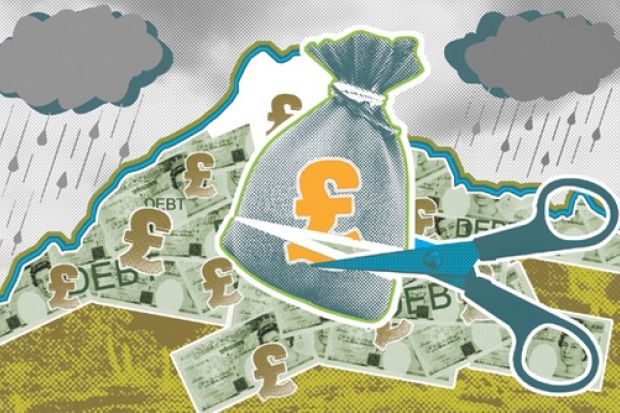Once upon a time in an earlier age of austerity, the ideas of two Liberals - John Maynard Keynes and Sir William Beveridge - inspired national recovery. Governments led markets, politicians dictated to bankers and public welfare was given primacy over private corporate interests. Another Great Depression was avoided.
In the current age of austerity, markets lead governments, bankers dictate to politicians and private corporate interests are given primacy over public welfare. A "Great Contraction" appears imminent.
The coalition's Comprehensive Spending Review spoke of an "unavoidable deficit reduction plan" and the need to make choices. These choices, which include a 23 per cent real-terms cut in (non-research) funding for England's universities, amount to a return to Depression politics. They have been presented by Nick Clegg, the deputy prime minister, and Vince Cable, the business secretary, as unavoidable, a political fait accompli borne of necessity "and the compromises of coalition".
These choices, including the abandonment of a signed undertaking to oppose tuition fees, were no such thing. They were deliberate but avoidable political choices, borne of the political ambition to govern.
In his last two speeches to the Liberal Democrats' autumn conference, Clegg has spoken of "progressive" austerity and "the new politics, plural politics, partnership politics, coalition politics" that will "transform the state" and turn "the tide of centralisation". Far from turning this tide, the coalition has offered England an acceleration of the rolling back of democratic citizenship, the rolling forward of centralised prescription over resource allocation and the nationalisation of public policy design that began under the Callaghan government in 1976 and continued vigorously under Margaret Thatcher, Tony Blair and Gordon Brown.
We have not seen a new politics in the coalition's first 16 months. Instead, we have witnessed the return of a defeatism in the face of economic recession absent from England since the 1930s.
Previous plans for public expenditure, including those for England's universities, have been portrayed as unsustainable. The failures of the state have been measured by the scale of its public debt. This debt and the shortcomings of the public domain are significant, but pale in comparison when measured against the failures of the unfettered market.
At the end of July, the UK's net public debt stood at £940.1 billion, or 61.4 per cent of gross domestic product. Far from being uncharted territory, this is actually a lower share of national income than in any year between 1917-18 and 1970-71. By contrast, a recent paper from the Bank for International Settlements calculates that UK corporate debt in 2010 amounted to 126 per cent of GDP and household debt to 106 per cent. Rescuing failed private banks and their liabilities has added a further £1,326.2 billion or 86.6 per cent of GDP to net public debt.
In an earlier era, a fully employed economy saw national debt wither from 252 per cent of GDP in 1946-47 to 74 per cent in 1969-70. During the 1970s, when the UK was purportedly "the sick man of Europe", the national debt fell further to 46 per cent of GDP in 1979-80. Only under Thatcher did the pace of reduction diminish.
Keynes and Beveridge taught us that both public and private debt can be reduced only by a more fully employed economy over a much longer time frame than the coalition imagines.
The effect of George Osborne's first two Budgets and the CSR has been to reduce the forecast for public sector net debt in 2013-14 by a mere £43 billion, from £1,294 billion to £1,251 billion. By contrast, the Office for Budget Responsibility forecasts that household debt will have spiralled from £1,560 billion in 2010 to £2,126 billion in 2015, an increase of £566 billion. Paradoxically, government debt remains cheaper to fund than either household debt or the capital borrowed under the Private Finance Initiative to fund the provision of public goods, assets and services in England.
The coalition's choices for higher education in England will not come cheap, either. Higher fees will mean an extra £5.6 billion a year in spending in 2015-16 and an additional £13.1 billion of public sector debt.
The economic dividend from "progressive austerity" is little more than the trimming of public debt and its substitution by much higher and more costly private debt.
Clegg, Cable and the 25 other Lib Dem MPs who voted for the introduction of higher fees in England would do well to reflect upon the political price for their party from Clegg's "progressive austerity". In addition to the net loss of four MPs at the May 2010 general election, the Lib Dems have already lost 14 councils and 880 seats in English local government elections - and spent most of the past six months languishing at between 9 and 11 per cent in national opinion polls.
If all Clegg's 2011 conference speech offers the electorate is a continuation of Depression politics and higher education reforms that perpetuate the existing corporate welfare-dependency culture, after the next general election the Lib Dem parliamentary party may be the size of a single tutorial group.
Register to continue
Why register?
- Registration is free and only takes a moment
- Once registered, you can read 3 articles a month
- Sign up for our newsletter
Subscribe
Or subscribe for unlimited access to:
- Unlimited access to news, views, insights & reviews
- Digital editions
- Digital access to THE’s university and college rankings analysis
Already registered or a current subscriber? Login
